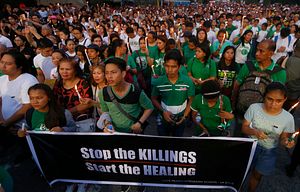Unidentified gunmen shot dead Athena Antonio’s father, Bonifacio, in September 2016, not long after Philippine President Rodrigo Duterte’s murderous “drug war” began on June 30. Bonifacio had been drinking beer with friends in Rosario, a district of Metro Manila’s Pasig City. Almost two years later, Athena confessed that her family had “completely lost hope” in pursuing justice for their father. The family “doesn’t want to feel more frustration with hitting dead ends. It hurts just thinking about it,” Athena told me.
Athena is not alone. In conversations with relatives of 18 “drug war” victims in recent weeks, I found echoes of her helplessness and frustration. They told me that the police have not adequately investigated the deaths of their loved ones. In not one case had the police even bothered to interview victims’ family members, a key step in any police investigation.
Since the “drug war” began, more than 4,200 people have been killed in what authorities call “legitimate police operations,” with more than 12,000 deaths in all linked to the anti-drug campaign. Research by Human Rights Watch and other organizations have revealed that the police have used the “drug war” as a pretext to summarily execute alleged drug suspects. Those investigations have exposed that police have staged crime scenes, planted evidence on victims’ bodies, and routinely claimed that they shot criminal suspects dead because they “fought back.”
On June 19, Duterte announced that families of “drug war” victims should not expect any justice from him and his administration. The Philippine National Police announced on June 20 that 674 police officers have been charged with “human rights violations” related to the anti-drug campaign, including homicide, illegal arrest, and torture. However, not one police officer has been tried and convicted for these crimes. Nineteen of those 674 police personnel have been dismissed from service while the remaining 655 were “meted penalties ranging from demotion to suspension.”
Even in the most well-documented incidents of police culpability, justice has stalled. In January, the Department of Justice charged three police officers with the murder of Kian delos Santos, a 17-year-old Caloocan City resident whose killing was caught on a surveillance camera. The three suspects are currently on trial, but even if they are convicted, Duterte has promised to pardon any police officers convicted of doing their “drug war” duties. Although murder charges were filed against police officers for the November 2016 killing in a jail cell of Rolando Espinosa, mayor of the town of Albuera in Leyte province, the Justice Department later downgraded the charges to homicide. Those suspects have posted bail and returned to active duty while they await trial. Although the new Philippine National Police director-general, Oscar Albayalde, has promised to make human rights “a key aspect of police operations,” he has also vowed to continue the “drug war” and has promoted police officers who supervised units linked to dozens of deaths.
Duterte’s government has also hobbled public pressure to provide accountability for the killings by subjecting critics of the government’s “drug war” to withering harassment, intimidation, or worse. Targets have included the official Commission on Human Rights, United Nations officials, and Senator Leila de Lima. On February 24, 2017, after a relentless government campaign against her, police arrested de Lima on politically motivated charges; she has remained in detention without trial ever since. In January, the government ratcheted up its attack on domestic media outlets that have exposed police involvement in “drug war” abuses by threatening to shut down Rappler.com.
These attempts to evade accountability and the continuing violence have frustrated families of victims. Tragically, Athena and other “drug war” victims’ relatives often blame themselves for the lack of justice for their loved ones’ deaths. “I feel like my family will be judged for not pursuing justice,” Athena told me via text message. “I feel guilty that I’m not able to do anything to stop other people from meeting the same fate as ours.”
The lack of accountability for the deaths of their loved ones and the thousands more in the “drug war” falls squarely on the shoulders of Duterte and his lieutenants. Duterte’s brazen incitement and instigation of “drug war” killings and his explicit refusal to provide any justice for those deaths underscore the necessity of an independent international investigation..
An ongoing International Criminal Court (ICC) “preliminary examination” into the “war on drugs” campaign and the June 19 declaration by 38 United Nations member countries for an inquiry suggest that Athena and other relatives of “drug war” victims may still get the justice that their government is denying them.
Carlos H. Conde is the Philippines researcher at Human Rights Watch.

































